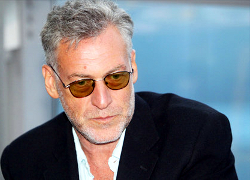Artemy Troitsky: Belarus will be European, but Russia won't
57- 20.01.2015, 8:47
- 51,224

Ukraine and Belarus will become parts of the EU.
It was said by famous Russian journalist Artemy Troitsky during a public discussion at European Humanities University in Vilnius on January 15.
“It will take a longer time for [Belarus] that the Baltic States and maybe Ukraine (which, I believe, will be a European country, too), but I am sure everything will finally be okay in Belarus. I do really want it, and I have no doubts it will come true,” he said.
Artemy Troitsky is not so optimistic about Russia's future: “The only country I have doubts about is Russia. I cannot guess what will happen to Russia. Its future is hidden behind a big dark cloud for me.”
Prominent cultural critic Artemy Troitsky lives in Tallinn and teaches at Tallinn University and the University of Helsinki. Darius Udrys, EHU's Vice-Rector for Development and Communications, moderated the discussion, which focused on the cultural and political situation in Russia, roots of public moods, Russia's influence on neighbouring countries and the stance of the contemporary Russia elite on the current events.
“I have always been optimistic about the future of Russia. I used to think that however long and winding the path may be, Russia will sooner or later become a normal country based on normal European principles – peace, freedom, enjoying life,” Artemy Troitsky said. “But Russia again shows it is a special country. I am a pessimist now. It seems that Russia is a country that will never fully accept normal European rules.”
The journalist thinks that the best experts in Russia are not politologists and analysts but artists and writers.
“Everything we see in Russia today, even small details, was in many ways predicted in Vladimir Sorokin's novels, for example, in Day of the Oprichnik.”
Troitsky recalls that Sorokin's novel was taken as a humorous dystopia when it was published nine years ago. According to Troitsky, we are witnesses of how grotesque ideas become the reality. “People read the book and laughed. Now it looks like a newspaper,” he jokes.
Troitsky notes that today's disturbances have a positive impact on culture and creative work in the same way as pressure in the Soviet time led to a rapid development of theatre in the 1970s and Russian rock music in the 1980s.
“I worked as a rock critic and music promoter. I can say exactly that the first half of the 1980s was the best time for Russian rock music. It was the time of the greatest figures in Russian music and greatest poets of that generation. But it was the time of the greatest pressure on rock music. It was in fact banned. People were arrested at concerts. At least two or three rock stars were jailed. But at the same time this period was the most inspiring one for music,” he says.
Troitsky thinks the calm and safe first decade of the 21st century was lost for the Russian culture, because few worthy works of art and culture were created. Everything has changed due to the current political instability in the country.
“I am happy that the same rock veterans who made the music revolution in Russia in the 1980s, such people as Shevchuk, Grebenshchikov and even Makarevich, are in the vanguard of the protest cultural movement now. I am really proud of them. I am happy that these guys have proved again how strong and talented they are,” Troitsky says.
Despite the fact that rock music, jeans and other symbols of the western pop culture played a big role in the collapse of the Soviet Union, moods of most Russians have changed completely.
“The influence of the West was strong but not deep, in my view. It began in the times of Peter I,but it has always covered small social groups – aristocracy in the 18th century, the nobility and intellectuals in the 19th century. It was 10-15% of the population. Jeans are good, rock music is fine, too, but Russian chanson has defeated rock music because it is closer to ordinary Russians,” the journalist thinks.
An open critic of the current regime, Troitsky does not see any signs of opposition that would take measures for changing the situation in addition to criticising. He compares the current situation in Russia with the contemporary history of Belarus.
“Russia has very serious intellectual resources. I admire Russian political and social journalism. I see excellent articles and I read them with pleasure. But it's all. There are many people in Russia and abroad, which we see more and more often, who can write something clever and good, something bitter, awful or impressing, but I don't see people who can do something,” he says.
Troitsky came to the discussion wearing a T-shirt reading "Navalny's Brother" to support jailed Oleg Navalny, the brother of Russian political activist Alexei Navalny. He noted that Navalny was the only person who tried to change something in Russia:
“To be honest, Navalny is the only person who tries to do something, yet he is under house arrest. He is a real hero.”
Living abroad and visiting Russia regularly, Troitsky doesn't care about his own safety.
“I am a rather careless person. I am 59. I've seen different times. I have never cared a lot about my security. It's normal so far. I don't think I am a dangerous dissident. Anyway, I only speak and write,” he said.









